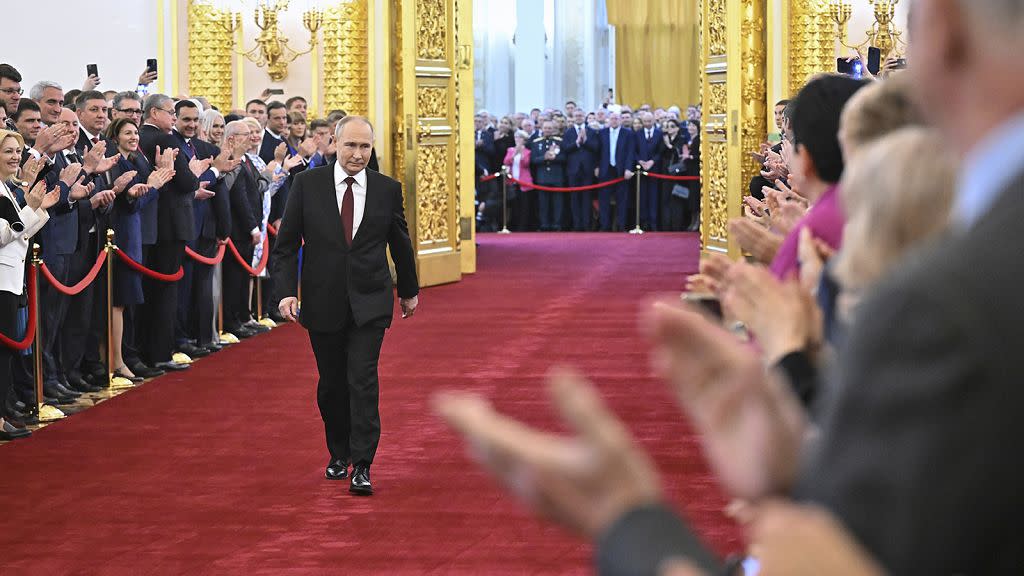Putin sworn in for fifth presidential term while his war in Ukraine continues

Vladimir Putin began his fifth term Tuesday as Russian president at a glittering Kremlin inauguration, setting out on another six years in office after destroying his political opponents, launching a devastating war in Ukraine and concentrating all power in his hands.
Putin has already been in office for nearly a quarter-century and is the longest-serving Kremlin leader since Josef Stalin. Putin’s new term doesn’t expire until 2030 when he will be constitutionally eligible to run again.
Representatives of some EU member states chose to attend the event despite the bloc's leaders condemning Putin's re-election in March as a sham.
France was represented by its ambassador to Russia, while Hungary and Slovakia - both of which maintain close ties to Moscow and espouse an ambiguous position on the war in Ukraine - also had their envoys in attendance, according to reports.
Representatives of four other EU states are also thought to have been represented. However, the Baltic states, the Czech Republic, the UK and Canada have joined the outright refusal to attend the ceremony, According to Radio Liberty.
Ahead of the event, Josep Borrell, High Representative of the European Union for Foreign Affairs, said he had warned member states not to send their reps to the event.
"I sent a message to all of them saying that my understanding is, the right thing to do is not to attend this inauguration," the EU's foreign policy chief stated.
"It was going to be very difficult for Ukrainians and many around the world to understand why we consider Putin, someone convicted by the International Criminal Court responsible for the war in Ukraine."
"We contested the elections because they were not free, nor fair elections - but then to attend the inauguration? It would be a clear contradiction," Borrell explained.
Orbán breaks ranks with the EU and congratulates Putin on 'his re-election'
The Kremlin announces nuclear weapons drills in warning to Ukraine's allies
Putin is approaching nearly a quarter-century in power. Following Russia's 2022 full-scale invasion of Ukraine, which has become Europe’s biggest conflict since World War II, the country has been heavily sanctioned by the West and is turning to other regimes like China and North Korea for support.
The question now is what Putin will do over the course of another six years, both at home and abroad.
'Pseudo-election' neither 'legal, free, or fair'
In March, Putin won the presidential race in a landslide election victory, garnering more than 87% of the vote, according to Russian election officials.
However, Numerous European leaders blasted the election, with questions arising over the legitimacy of the vote since Russia's number one faced no credible opposition candidates amid a ruthless crackdown on dissent and critical voices.
German President Frank-Walter Steinmeier called the vote a "pseudo-election," while the Polish Foreign Ministry described it as being neither "legal, free, or fair".
On 17 April, the Parliamentary Assembly of the Council of Europe (PACE) adopted a resolution calling on member states to "not recognise Vladimir Putin as president of the Russian Federation" and to "cease all contacts with him" except for humanitarian ones. Representatives of the Russian opposition in exile, including Yulia Navalnaya, have already made similar demands.
Prior to the event, Kremlin spokesman Dmitry Peskov did not disclose the list of foreign guests in the Andreyevsky Hall of the Grand Kremlin Palace, state-owned RIA Novosti reported.
Over the past few weeks, Russia has been intensifying its offensive against Ukrainian forces in the Donetsk region, while Kyiv is experiencing a shortage of men and ammunition.
At the same time, the shelling of Russian border regions by drones and missiles has continued.
Analysts say the Kremlin aims to "please" the domestic Z-public and capture Chasiv Yar in time for Victory Day on 9 May.
Putin is expected to renew the government at the beginning of his next term: under the constitution, the cabinet resigns after inauguration.
Putin could re-appoint current technocratic Prime Minister Mikhail Mishustin and key government members, including Defence Minister Sergei Shoigu, and make new appointments to continue militarising the Russian economy.
Experts believe that now that Putin has six more years in power, the government may take unpopular steps, such as raising taxes to finance the war and sending more men into the army.


